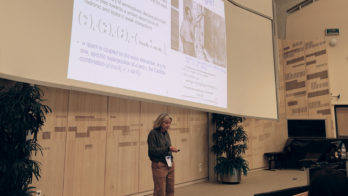
Measurements of the differential cross-section in proton–proton (pp) or proton–antiproton (pp) scattering have generally proved consistent with a pure exponential dependence at low values of the square of the four-momentum transfer, ǀtǀ. However, slight deviations have been observed, notably in elastic pp and pp scattering at the Intersecting Storage Rings at CERN. Now, the TOTEM experiment has made a precision measurement of elastic pp scattering at the LHC, and finds that the data exclude a purely exponential behaviour of the cross-section at low ǀtǀ at a total energy of 8 TeV in the centre of mass.
The TOTEM experiment, which co-inhabits point 5 on the LHC with CMS, includes a system of Roman Pots, which allow detectors to be brought close to the beam so as to intercept particles scattered at very small angles to the beam. The Roman Pots are in two stations on opposite sides of interaction point 5, and each station is equipped with detectors at both 214 m and 220 m from the interaction point. The detectors consist of stacks of silicon-strip sensors, specially designed to have a narrow insensitive region, of a few tens of micrometres, along the edge that faces the beam (CERN Courier September 2009 p19).
TOTEM collected the data during a special run at the LHC in July 2012, in which the Roman Pots were brought in to a distance of only 9.5 times the transverse beam size of the beam. During 11 hours of data taking, the experiment amassed 7.2-million tagged elastic events at a collision energy of 8 TeV. The large data set has allowed a precise measurement of the elastic pp cross-section, with both statistical and systematic uncertainties below 1%, except for overall normalization. As a result of this precision, TOTEM is able to exclude a purely exponential differential cross-section in the range 0.027 < |t| < 0.2 GeV2, with a significance greater than 7σ. In contrast, parameterizations with either quadratic or cubic polynomials in the exponent are compatible with the data.





